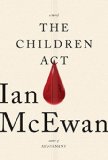Summary | Excerpt | Reading Guide | Reviews | Beyond the Book | Readalikes | Genres & Themes | Author Bio

Critics' Opinion:
Readers' Opinion:
First Published:
Sep 2014, 240 pages
Paperback:
Apr 2015, 240 pages
 Book Reviewed by:
Book Reviewed by:
Suzanne Reeder
Buy This Book
Men did not receive much education either. From their mid-teens, they were expected to give most of their time to studying the Torah. Generally, they did not go to university. Partly for this reason, many Haredim were of modest means. But not the Bernsteins, though they would be when their lawyers' bills were settled. A grandparent with a share in a patent for an olive-pitting machine had settled money on the couple jointly. They expected to spend everything they had on their respective silks, both women well known to the judge. On the surface, the dispute concerned Rachel and Nora's schooling. However, at stake was the entire context of the girls' growing up. It was a fight for their souls.
Haredi boys and girls were educated separately to preserve their purity. Modish clothes, television and the Internet were forbidden, and so was mixing with children who were allowed such distractions. Homes that did not observe strict kosher rules were out of bounds. Every aspect of daily existence was well covered by established customs. The problem had started with the mother, who was breaking with the community, though not with Judaism. Against the father's objections, she was already sending the girls to a coeducational Jewish secondary school where television, pop music, the Internet and mixing with non-Jewish children were permitted. She wanted her girls to stay on at school past the age of sixteen and to go to university if they wished. In her written evidence she said she wanted her daughters to know more about how others lived, to be socially tolerant, to have the career opportunities she never had, and as adults to be economically self-sufficient, with the chance of meeting the sort of husband with professional skills who could help to support a family. Unlike her husband, who gave all his time to studying, and teaching the Torah eight hours a week without pay.
For all the reasonableness of her case, Judith Bernstein—angular pale face, uncovered frizzy ginger hair fastened with a huge blue clasp—was not an easy presence in court. A constant passing forward with freckly agitated fingers of notes to her counsel, much muted sighing, eye-rolling and lip-pursing whenever her husband's counsel spoke, inappropriate rummaging and jiggling in an outsized camel leather handbag, removing from it at one low point in a long afternoon a pack of cigarettes and a lighter—provocative items in her husband's scheme, surely—and lining them up side by side, on hand for when the court rose. Fiona saw all this from her advantage of height but pretended not to.
Mr. Bernstein's written evidence was intended to persuade the judge that his wife was a selfish woman with "anger- management problems" (in the Family Division, a common, often mutual charge) who had turned her back on her marriage vows, argued with his parents and her community, cutting the girls off from both. On the contrary, Judith said from the stand, it was her parents-in-law who would not see her or the children until they had returned to the proper way of life, disowned the modern world, including social media, and until she kept a home that was kosher by their terms.
Mr. Julian Bernstein, reedily tall, like one of the rushes that hid the infant Moses, apologetically stooped over court papers, sidelocks stirring moodily as his barrister accused his wife of being unable to separate her own needs from the children's. What she said they needed was whatever she wanted for herself. She was wrenching the girls away from a warmly secure and familiar environment, disciplined but loving, whose rules and observances provided for every contingency, whose identity was clear, its methods proven through the generations, and whose members were generally happier and more fulfilled than those of the secular consumerist world outside—a world that mocked the spiritual life and whose mass culture denigrated girls and women. Her ambitions were frivolous, her methods disrespectful, even destructive. She loved her children far less than she loved herself.
Excerpted from The Children Act by Ian McEwan. Copyright © 2014 by Ian McEwan. Excerpted by permission of Nan A. Talese, a division of Random House LLC. All rights reserved. No part of this excerpt may be reproduced or reprinted without permission in writing from the publisher.





The Flower Sisters
by Michelle Collins Anderson
From the new Fannie Flagg of the Ozarks, a richly-woven story of family, forgiveness, and reinvention.

The House on Biscayne Bay
by Chanel Cleeton
As death stalks a gothic mansion in Miami, the lives of two women intertwine as the past and present collide.

The Funeral Cryer by Wenyan Lu
Debut novelist Wenyan Lu brings us this witty yet profound story about one woman's midlife reawakening in contemporary rural China.
Your guide toexceptional books
BookBrowse seeks out and recommends the best in contemporary fiction and nonfiction—books that not only engage and entertain but also deepen our understanding of ourselves and the world around us.